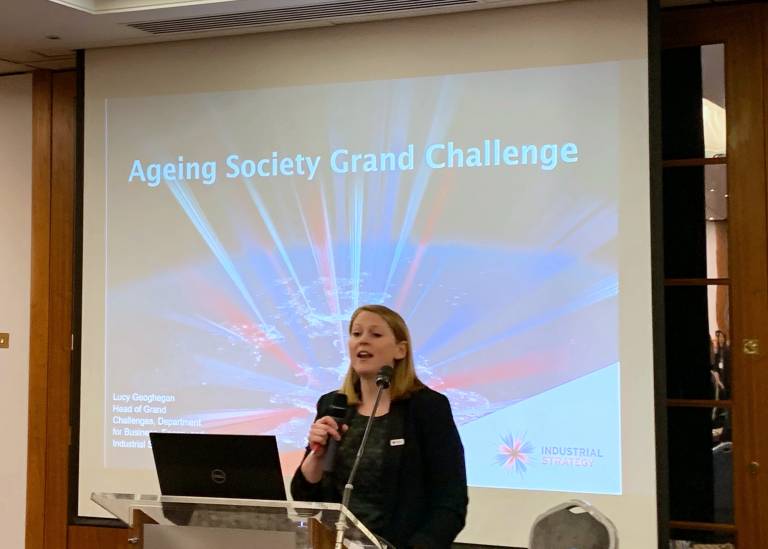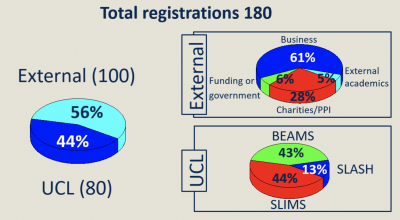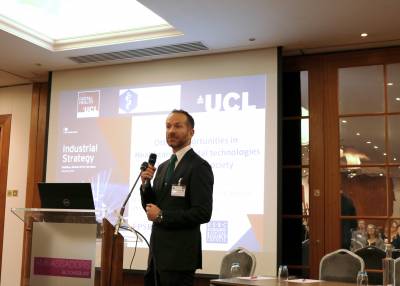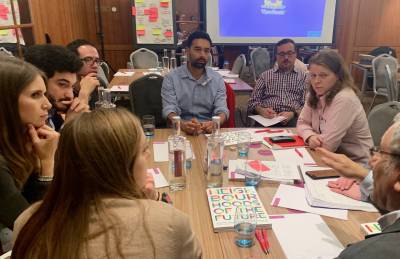Healthy Ageing Symposium: living better for longer
5 March 2019
Thanks to advances in healthcare, people in the UK are living longer than ever before.

Pictured above: Lucy Geoghegan, Department for Business, Energy and Industry
In 2016 there were 1.6 million people aged over 85 – by 2041 this is expected to double. An ageing population brings new challenges. People in later life can struggle with deteriorating health, loneliness and difficulty accessing services. Society needs to adapt to meet older people’s needs and provide them with a better quality of life.
This was the premise of last month’s ‘Healthy Ageing Symposium’ – co-hosted by the UCL Institute of Healthcare Engineering and the UCL Institute of Digital Health. Bringing together academics, industry leaders and charity representatives, the event aimed to address the challenges of ageing healthily. In particular, helping people live at home longer, tackling loneliness and increasing independence and wellbeing.
With more than half of attendees coming from outside UCL, there was an excellent diversity of voices. Amongst the academic attendees, many different disciplines were represented, including engineering, medicine and the social sciences.

Lucy Geoghegan from the Department for Business, Energy and Industry explained the UK Government wants to make this a priority. As part of their Ageing Society Grand Challenge, their vision is to ensure people can enjoy at least five extra years of healthy, independent life by 2035. The ‘Healthy Ageing’ Challenge is looking to invest up to £98 million in research and innovation for the development of services, products and technologies that support people as they get older. Lucy emphasised the need for academia, industry and government to work together to achieve this.
Hazel Harper from Innovate UK discussed the challenges of reaching older consumers, who are quite often overlooked by businesses. Innovate UK is the government’s innovation agency. They drive productivity and economic growth by supporting businesses with funding.
“As soon as you say something is for older people, older people don’t want it”. Hazel said we need to change our negative perception of older consumers and make sure we frame older life in a positive light.
Dr Eugenio Zapata-Solvas, Strategic Research Facilitator at UCL played a key part in organising the day. His role centres on facilitating and supporting research in line with the Industrial Strategy Challenge Fund (ISCF). Eugenio provided a deeper insight into the funding opportunities available in this area, including funding programmes by NIHR and ZINC.

Dr Eugenio Zapata-Solvas
These presentations set the scene for two panel discussions. The first addressed the needs and challenges of an ageing society. Prof Ann Blandford asked the group of not-for-profit representatives how they think people feel about getting older.
Sharon Tynan from Age UK London said people’s feelings about growing older will vary largely depending on sexual orientation, finances and location. While older people hold a significant amount of wealth, Sharon emphasised that many struggle financially – and therefore they cannot access expensive technology.
Daniel Pattison from the Campaign to End Loneliness explained how many people conceptualise old age as something that happens to other people. And this disconnect can have ramifications on the way we treat our minds and our bodies. Daniel went on to say that while technology can facilitate communication between people, it cannot replace human kindness and technological solutions must be designed with compassion at the centre.
The second discussion focused on business perspectives and how industry can address older people’s needs.
Jonathan Burr, founder of Howz – an assistive living product – echoed the concerns of the previous panel. He expressed the importance of user-centred design. “It’s easy to get allured by fancy glossy tech, but there’s a large number of people who need something more basic”.
Dr Mike Short, Chief Scientific Officer at the Department for International Trade said the older generation is gradually coming up to speed with digital technology, pointing out the internet is over 30 years old. He said the UK could learn from Japan which is successfully integrating digital technology and healthcare.
Dr Rui Louriero then asked the group how they think collaboration with charities and academia could help industry address these needs. Jonathan Burr said the great advantage of working with academics and charities was access to patients and evidence. Terry Ernest from GSK said it was important for industry and academics to benefit from each other’s expertise.
In the afternoon, attendees split into four themed sessions:
- Physical activity during ageing
- Age-friendly infrastructures
- Social engagement/services during ageing
- Care support for age-related diseases & extending independence at home
The smaller sessions gave people from different backgrounds an opportunity to mix and have more in-depth discussions. Many groups came up with strong ideas they intend to carry forward.

There was a strong air of positivity and enthusiasm following the event. Follow-up session are being planned to ensure the ideas and connections from symposium generate concrete impact. Qualifying UCL academics can apply for further follow-up seed funding to develop links, ideas and collaborations on this topic.
From the ideas discussed symposium, we developed policy briefings to tackle five different areas of concern for our ageing population.
If you are interested in any of these topics and would like more information, contact healthcare-eng@ucl.ac.uk
 Close
Close

